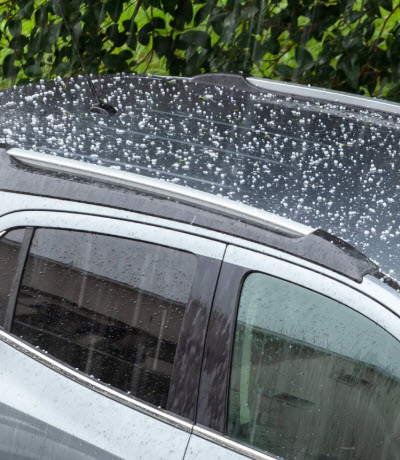How to fight a rental car damage scam
23 May 2025
The travel news is full of rental car scams and some of the recent ones are kinda scary. The scam that’s making the news lately starts with the traveler getting locked out of the car because it’s remotely disabled. When the traveler contacts customer service, they are unknowingly dialing the scammer and not bonafide rental car agents.
How does this happen?
Scammers are very good at manipulating search results and creating fake websites that look legitimate. They place stickers with their phone numbers on rental cars or create online listings that appear at the top of search results when you Google “rental car customer service.”
When you’re stressed about being locked out of your car it’s easy to call the first number you find without double-checking if it’s legitimate. Even worse if the weather is bad, your speaking with someone who doesn’t speak your language, and you locked the rental agreement inside the car!
The scammer then pretends to be customer service, claiming they can fix the problem if you provide credit card information for a “security verification” or “emergency service fee.” Once they have your payment details, they can drain your account while you’re still in a parking lot with a disabled car.Scam alert: Some scammers convince travelers to purchase gift cards to settle their bill. This is a red flag warning sign to watch out for!

Know How to Protect Yourself from Rental Car Damage Scams
This is important, and I’ve written about it a few times. Here’s that article if you need to familiarize yourself with the steps to protect yourself:
How to protect yourself from rental car damage scams
This is a very important step on every trip you take!
Hint: it starts and ends with photographic evidence of the condition of the vehicle.
Know Your Rights When Fighting a Damage Claim
That unexpected charge on your credit card from the rental car company can feel like a punch to the gut. But don’t panic – you have more rights than you might think, even after they’ve charged your card. Rental companies must provide clear evidence of damage and proof of repairs to legally justify keeping your money.
Here’s what the rental company must show you – and if they can’t, your credit card company will likely side with you in a dispute:
- Clear, time-stamped photos showing the specific damage they’re charging you for (you can compare these with your own recorded photos or videos)
- Documentation proving the damage wasn’t there before your rental
- Actual repair invoices (not just estimates) showing the work was done
- Proof that the damage occurred during your rental period
Pro tip: Many rental companies send automated damage claims hoping you’ll pay without questioning. Always request complete documentation, even if they act like you don’t have the right to see it. If they can’t provide these basic pieces of evidence, you have solid grounds for disputing the charge with your credit card company.
Don’t wait to act! Most credit card companies give you 60 days to dispute a charge, so request the documentation immediately. Send your request in writing (email is fine) so you have a record of when you asked for proof of the damage claim.
If you have insurance for your car back home and/or used a credit card with travel insurance, get in touch with both of those providers and see if they can help you. Even if they can’t fix it, they’re likely to have some excellent advice you can follow to get yourself out of that charge.
Document Everything During the Dispute ✍️
The moment you spot that unauthorized charge, start building your case. Create a simple file (digital or paper) with everything related to your rental and the dispute. Remember, you’re not just collecting evidence – you’re creating a clear paper trail that proves your side of the story.
Step 1: Take immediate action to protect yourself by locking the credit card used to rent the car. This will block future charges from happening.
This protective step is crucial because some rental companies have been known to add multiple charges or “processing fees” after the initial damage claim. Securing your card gives you time to dispute the charges without worrying about additional unauthorized withdrawals.
Pro tip: This type of situation is why I always recommend traveling with more than one credit card. If one is lost or stolen, or has to be locked, you still have access to cash.
Here’s your documentation checklist:
- Screenshot the charge on your credit card statement
- Save all emails between you and the rental company
- Write down names and times of any phone conversations (but always follow up important calls with an email to create a record)
- Request these specific items from the rental company:
- Time-stamped photos of the alleged damage
- Copy of the original rental agreement
- Final inspection report from when you returned the car
- Actual repair invoices (not just estimates)
- Documentation showing the car was rented to someone else after you
Pro tip: If the rental company claims weather-related damage (like hail), save screenshots of weather reports from your rental period. Your phone’s location history can also prove where you actually drove – download this data before it expires.
Warning: Rental companies often use third-party collection agencies to handle damage claims. If you receive collection notices, respond in writing within 30 days to dispute the debt and request validation. This legally requires them to prove the debt is valid before they can continue collection efforts.
Fight Smart, Not Loud
When you’re dealing with an unfair charge, it’s natural to feel angry. But successful disputes require strategy, not emotion. Your goal is to be persistent and professional, showing the rental company you understand your rights and won’t back down – while keeping all communications calm and documented.
Here’s your escalation strategy:
- Start with a formal dispute letter to the rental company
- State facts, not accusations
- Include dates, rental agreement numbers, and charge amounts
- Request specific documentation (as listed in your paper trail)
- Give them a reasonable deadline to respond (usually 14 days)
- Open a parallel dispute with your credit card company
- Many card issuers have special protections for car rental disputes
- Submit copies of all your documentation
- Ask about temporary credit while they investigate
- Keep checking your dispute status online
- If the rental company isn’t responding:
- Escalate to corporate customer service (avoid the local office)
- Contact your state’s consumer protection office
- File a complaint with the Better Business Bureau
- Consider small claims court if the amount warrants it
Pro tip: Use this template for executive contacts: “I’m writing about claim number [X]. I’ve attached [list documents] showing why this charge is incorrect. Please review and respond by [date]. I can be reached at [your contact info].”
Warning: Some rental companies may threaten to add you to their “do not rent” list. Don’t let this scare you into paying an invalid charge – if you have documentation proving your case, stand firm and remember there are other rental car companies.
Damian Tysdal is the founder of CoverTrip, and is a licensed agent for travel insurance (MA 1883287). He believes travel insurance should be easier to understand, and started the first travel insurance blog in 2006.
